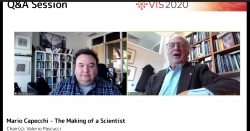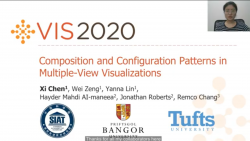Newsletters
Academics present their research at the 2020 virtual IEEE Visualisation conference
Researchers from the Visualisation, Data, Modelling and Graphics research group of the School of Computer Science and Electronic Engineering presented their research at the IEEE Visualization conference () which took place between the 25th and the 30th of October 2020.
VIS 2020 was the 25th international conference on visualisation that has been organised by the . The conference attracted practitioners from universities, governments and industry to discuss and present findings on the design and use of visualisation tools and techniques. It was the first year that the conference had been organised online and was the largest IEEE visualisation conference with over 5314 registrations from all over the world. It was organised and hosted by the University of Utah and was streamed live on YouTube with dynamic interactions occurring over Discord.
Professor Roberts said “It was great to participate in this virtual conference. Researching data visualisation is important and timely. The world is faced with datasets that are constantly growing, in size, complexity and have ever-increasing quantity of variables. We need to push the boundaries of science, use supercomputing to help analyse the data quickly, and research new ways to interact with and visualise data”. Roberts continued by saying “The conference marked the culmination of successful research that has taken place in the School, in the area of data visualisation, data analysis and immersive reality. It was wonderful to see that six people from the School were involved in the conference, presenting two full journal papers, a poster paper and we organised and participated in two workshops.”
Dr Ritsos said: “It is always inspiring to see world-class researchers from top universities, presenting their work. And it is even more exciting for us to be amongst them with our research, and community engagement. We are particularly proud this year to be presenting VRIA, a project which has been built over four years, and builds upon early experimentation with Web-based XR. We are one of the few Universities which works on this cutting-edge theme, amongst organisations such as W3C, Google, Microsoft and Mozilla.”
The keynote was given by Mario Capecchi, a molecular geneticist and a co-winner of the 2007 Nobel Prize in Physiology or Medicine. In his talk “the making of a scientist” he reflected on his research life and his discoveries that led to his Nobel Prize
 Mario Capecchi answering questions after his keynote, with the VIS 2020 conference chair Valerio Pascucci
Mario Capecchi answering questions after his keynote, with the VIS 2020 conference chair Valerio Pascucci
The group presented the following work:
- Pete Butcher (a research Postdoc in the School) and Panagiotis (Panos) Ritsos presented their IEEE Transaction on Visualisation and Computer Graphics paper, titled. Their framework is also available on Github so others can create immersive and virtual reality visualisations.
- Hayder Al-Maneea, a PhD student, and Jonathan Roberts presented ongoing work on the analysis and use of Multiple views in data visualisation. The paper titled was the result of an international research collaboration with academics from Shenzhen Institutes of Advanced Technology, Chinese Academy of Sciences and University of Chinese Academy of Sciences, and Tufts University, USA.
- Third year undergraduates Daniel Farmer and Rhys Williams, along with Panos and Jonathan, presented a poster titled “Immersive visualisation of COVID-19 UK travel and US happiness data”. The work was presented as an . The work was based on activities carried out under the �鶹��ý����� Undergraduate Internships scheme.
- Jonathan also chaired jointly a workshop on and participated on the .
 Xi Chen, presenting the work on Composition and Configuration Patterns in Multiple-View Visualisations
Xi Chen, presenting the work on Composition and Configuration Patterns in Multiple-View Visualisations
Rhys Williams said “I thoroughly enjoyed the conference, as a newcomer to this sort of environment I found it a bit overwhelming at first. But, as an undergraduate, I found it greatly beneficial to get such an insight into the academic world, and to witness the quality and effort put into some of the papers, and many were a great benefit to my own research. As there was much innovation and experience to learn from”.
Publication date: 6 November 2020
